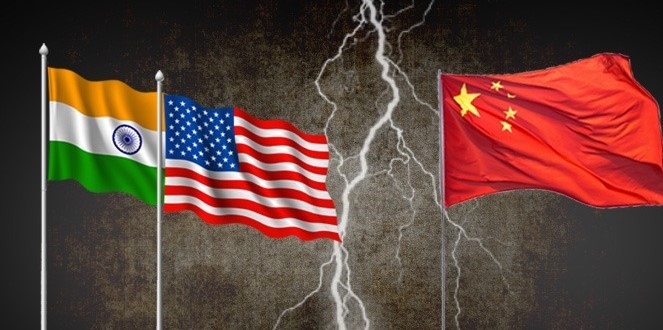Dr Shakir Ahmed Shahid
Doklaam and Ladakh incidents are nothing less than a chapter break in the strategic landscape between India and PR China. It’s fundamental redefinition of the nature of Sino-Indian “old normal”. It should be remembered that neither details of the incidents are important nor comparison of military powers. Neither does it carry any significance that they both countries have disengaged. What most important is that Asia has entered into a new strategic epoch with the start of active rivalry between two neighboring Asian giants.
In contrast to Korea, Vietnam and finally Afghanistan which were the theaters of previous cold war the theaters for this new cold war are the frozen heights of Himalaya and the deep blue waters of Indian and Pacific Oceans. Though any imminent full scale escalation in kinetic domains is not predicted; however, now onward the possibility of limited skirmishes has increased manifold. By all calculations it’s the start of another cold war, and unfortunately again at the gates of Pakistan who is still struggling to clean the spilled out mess created by the previous cold war.
Given the deterministic effect of Indian geography and its history on psychology of Indian strategists India will adopt a confrontational mode though gradually and silently. And tussle between two Asian countries flanking great Himalaya would keep increasing silently or violently. It’s expected that Ladakh clash would exert deep bearing on Indian strategic approach toward various regional and global actors. A lot of political, diplomatic, economic and strategic maneuvers shall be happening at enhanced speed and countries shall get pushed willingly or unwillingly to various alignments and alliances.
It appears that the Doklaam-Ladakh duo would start a process of auto-catalysis, wherein one of the products of the reaction acts as a catalyst to speed up the pace of reaction, in various directions. Where drifting of domestic political power to Hindutva hardliners in India would serve as a catalyzing factor is hardening of Indian foreign policy toward PR China and Pakistan there the cold war environment would further augment the grip of Hindu nationalists on internal power politics. Hindutva (hinduness) philosophy would become even more pervasive in the social fabric of Indian society and the breathing space for minorities and the enlightened minds shall get reduced further.
Ironically a large part of the non-territorial strategic calculus between PR China and India would revolve around Pakistan. Additionally not only a major part of overall strategic maneuvers shall be made in close vicinity of Pakistan but the approach of many regional and international players toward Pakistan would also get modulated by the evolving strategic equations between principal players. And above all in this cold war every participant would be playing half of the game on the table and rest half off the table so Pakistan should also adopt the same in currency.
Pakistan must observe the hologram of the cold war from its all angles and on an evolving basis. Pakistan needs to take into consideration all possible scenarios from start to end and should adopt a dynamical strategy accordingly by keeping its national interests on forefront. Without forgetting the ingrained animosity of Hindutva minds toward her very existence, Pakistan needs to be sober and calculated in her approach to various situations and opportunities, and must not get allured to venture into any kinetic action in haste.
In the weaponry domain India would not only develop but acquire a lot of modern military platforms. Again without getting trapped into an adversarial swirl and an armed race, Pakistan must acquire critical military platforms essential for maintaining a credible deterrence on continental and maritime fronts both. Jammu and Kashmir, Ladakh, Junagarh and Sir Creek are integral and unalienable parts of Islamic Republic of Pakistan and Pakistan must keep pressing her claim on all international forums.
By adopting a new approach toward Pakistan by practically abandoning the policy of “strategic restraint” India has already established a new normal. Hence Indian deep state might contemplate for any attempt to restore her molested image on international and national level hence Pakistan should remain prepared to respond befittingly to any kind of misadventure. In a sense this cold war shall afford breathing space to Pakistan if moved cautiously hence Pakistan should utilize this crisis in the best possible way.
Currently Pakistan is under intense attack by a swarm of distractive and destabilizing weaponized narratives. Hence in addition to developing strategic levers in kinetic domains Pakistan should concentrate on protecting national security in non-kinetic non-contact domains also. For ensuring sustainable national security a modern, progressive, logical, and universal narrative in line with fundamental tenets of Islam and indigenous culture should be re-infused in Pakistani society.
Pakistan is a country of 220 million people whose 64% is below 30 thus making Pakistan as the second youngest country in South Asia after Afghanistan. This exceptional asset in the form of youth bulge should be trained, developed and streamlined. Regarding spheres of influence Pakistan should specially focus on its west including central Asia and should enhance its effective presence therein.
Pakistan is a country of unmatched significance situated between two great civilizations viz Turko-Persian Muslim civilization in the west and Ganges-Hindu civilization in the East. Pakistan is not only the sole territorial successor to the great non-Hindu Indus Valley Civilization but also De jure successor to glorious South Asian Muslim Civilization and Rule which lasted for one thousand years.
Due to its unique geographical history, shared heritage with Turko-Persian Central Asia, diversified cultural make-up, liberal democratic values, progressive people, strong military and nuclear capability Pakistan is one of the greatest countries of the globe. Hence Pakistan and Pakistani nation should remain confident, sober and determined to protect its sovereignty, national interests and the universally cherished values.
Dr Shakir Ahmad Shahid, Ph.D, PSP, is a Postdoct Fulbright Alumnus in Forensic Science and Criminology, who has served in various fields like Policing, Investigation, Intelligence and Counter-Terrorism on policy and operational levels as a Senior Police Officer and Director (counter terrorism). He has also worked in fields of Education, Investment and Rural Development as a civil servant, and in the field of Agriculture as a farmer. Dr. Shahid holds the degree of Doctor of Philosophy in Chemistry with research publications in fields of bio-materials, bio-energy, polymers and forensic spectroscopy. He also holds the degrees of Master in Psychology, M.Sc Chemistry, L.L.B, and B.Sc (Biology), along with qualifications in fields of crime management, police command, public administration, international law, history, forestry, and agriculture. In addition to being PhD Research Scholar in Criminology he is a passionate researcher in theoretics of complex systems, energy evolution, negentropes, information, cyborgology, socionics, sustainability, human behavior, history, national narrative, social re-engineering, policing, intelligence, governance, national security, electro-magnetic spectrum, and forensic evidence. He can be reached at [email protected]



